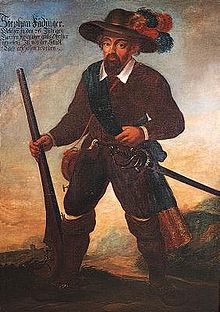Upper Austrian peasant war of 1626
The motive (found in the Frankenburger Würfelspiel of 1625) was an escalation of the Bavarian Electorate's attempt to press the country into the Catholic faith at the time of the Thirty Years' War.Adam von Herberstorff, the Bavarian steward of Upper Austria, called all of the men from the region to the Haushamerfeld near Frankenburg to hold the assizes.Over the next year, the peasants secretly prepared for war by recruiting a man from every farmer's house, supplying them with weapons, and teaching them tactics.They intended to attack on the Pentecost, but war had broken out two weeks earlier, when Bavarian soldiers tried to steal a horse in Lembach im Mühlkreis.The 5,000-strong peasant army went on to besiege Eferding, Wels, Kremsmünster, and Steyr, finally arriving at Linz, which did not surrender despite being defended by only 150 Bavarian soldiers.

Thirty Years' WarUpper AustriaHoly Roman EmpireBavariaStefan FadingerGermanrebellionBavarian ruleFrankenburger WürfelspielCatholicHouse of Habsburgcuius regio, eius religioProtestantFrankenburg am HausruckPentecostLembach im MühlkreisPeuerbachEferdingKremsmünsterPappenheim'sPeasant revolts in medieval and early modern EuropeBagaudaeStellingaRebellions of Basil the Copper HandUprising of IvayloPeasant revolt in Flanders 1323–28St. George's Night UprisingJacquerieCiompi RevoltPeasants' Revolt in EnglandHarelleCabochien RevoltTransylvanian peasant revoltFunen and Jutland Peasant rebellionsJack Cade's RebellionJohn and William Merfold's uprisingCarinthian Peasant RevoltFriulian Revolt of 1511Poor ConradDózsa rebellionSlovene peasant revolt of 1515Arumer Zwarte HoopGerman Peasants' WarDalecarlian RebellionsPalatine Peasants' WarSkipper Clement's RebellionOpryshkyDacke WarKett's RebellionCudgel WarCroatian–Slovene Peasant RevoltIvan Bolotnikov's RebellionPeasants' War in Upper AustriaKostka-Napierski UprisingMorning Star RebellionSwiss peasant war of 1653Stenka Razin UprisingBulavin RebellionDalecarlian Rebellion (1743)Pugachev's RebellionRevolt of Horea, Cloșca and CrișanGreat FearSaxon Peasants' RevoltPeasants' War (1798)